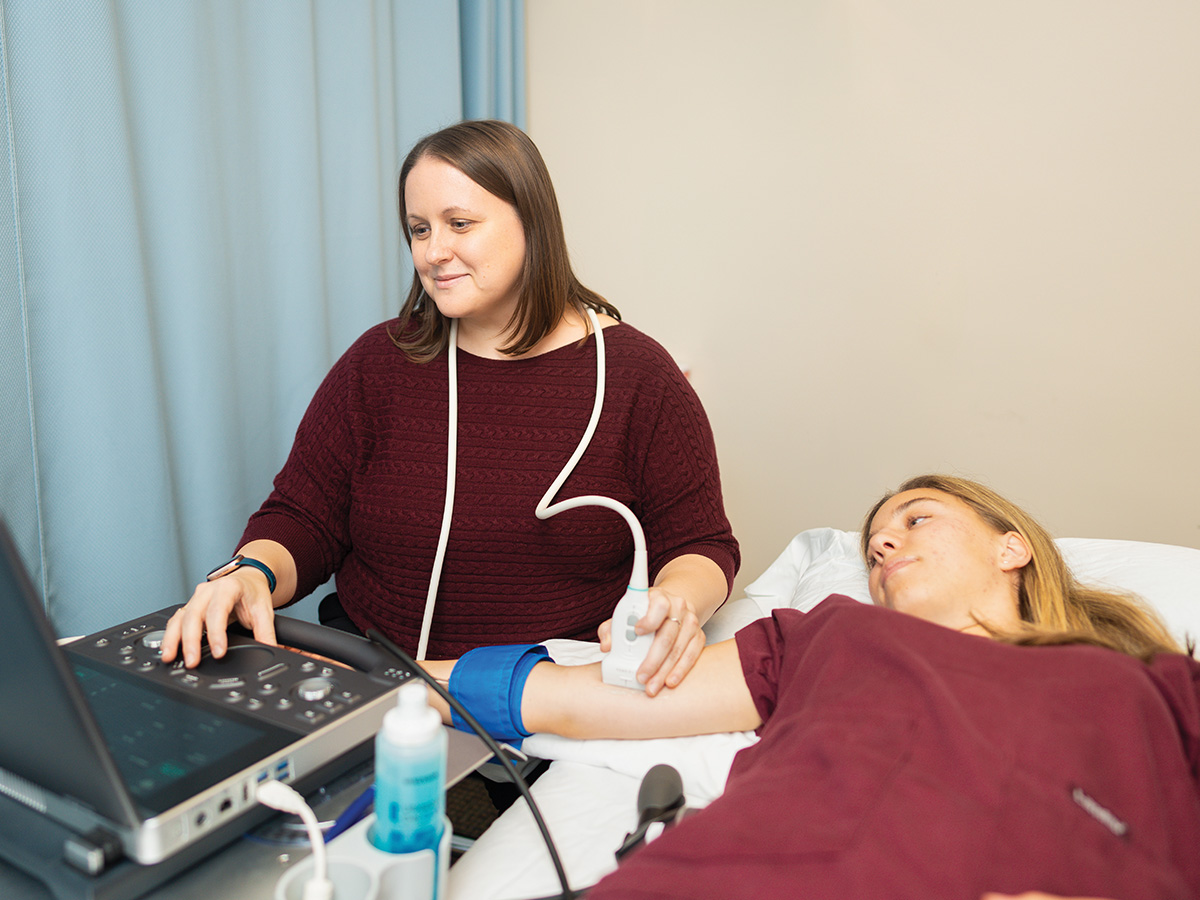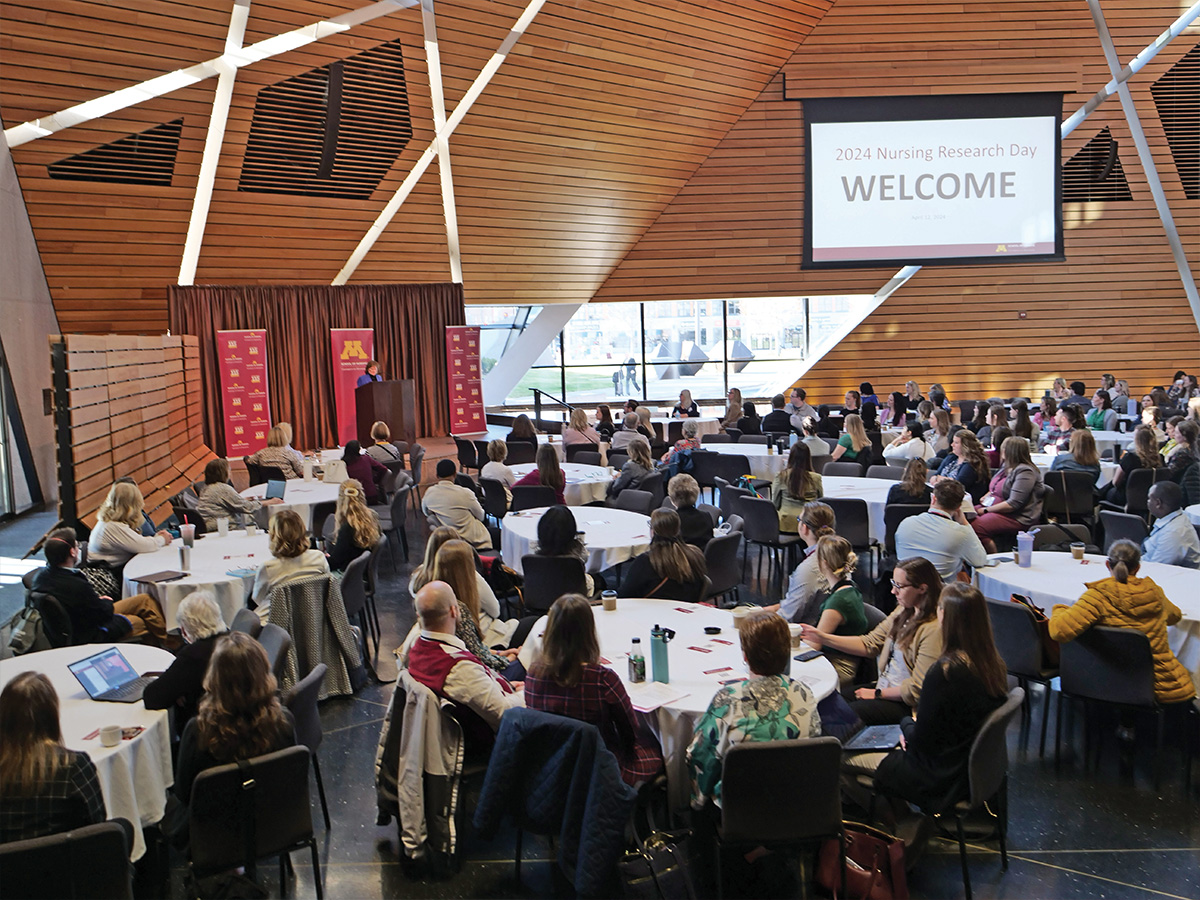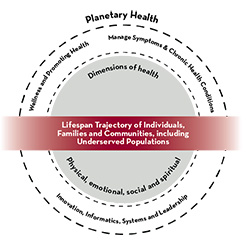
The School of Nursing advances health discoveries through nursing research and scholarship. It is nurse-driven, ecological in philosophy, and emphasizes health promotion among vulnerable populations, prevention and management of chronic health conditions, symptom management, and health informatics and systems improvement.
Pain management for rural veterans
Researchers are developing a comprehensive pain management program for rural veterans, who have more severe pain than the average person but less access to care. Roni Evans, DC, PhD, director of the Earl E. Bakken Center for Spirituality & Healing’s Integrative Health and Wellbeing Research Program (IHWRP) is collaborating with two Veterans Administration-affiliated researchers to develop a 12-week program that includes one-on-one health coaching, video lessons, group discussions and exercises to manage pain in both the mind and the body. The project is supported by over $4 million in anticipated funding from the National Institute of Nursing Research, part of the National Institutes of Health, as part of the Helping to End Addiction Long-term Initiative.
New report examines risk factors associated with maternal morbidity, mortality
Previous efforts to explain the factors driving maternal mortality and morbidity have fallen short. A new report, co-written by Assistant Professor Carrie Neerland, PhD, APRN, CNM, FACNM, aimed to fill this gap by undertaking a comprehensive review of academic studies focused on risk factors associated with maternal morbidity and mortality during the prenatal and postpartum periods. The research was conducted as part of the NIH Pathways to Prevention Program, which helps identify research gaps in key health.
Advancing nursing research at the Minnesota State Fair
In addition to trying the new bacon-wrapped waffle dog, Minnesota State Fairgoers had the opportunity to advance nursing research by visiting the Driven to Discover Research Facility. Six School of Nursing research projects were conducted at the fair in August, with topics ranging from reproductive health and nutritional food access to how kids feel about their lives and how patients use electronic medical records.
Initiative continues to examine the ethics of AI in nursing
The steering committee for the School of Nursing-led initiative to examine the ethical implications of the use of artificial intelligence (AI) in nursing continues to have discussions to move its work forward. The school launched the initiative in 2023 to develop a framework for the future use of AI in nursing.
Dean Delaney appointed to Governor’s Task Force on Academic Health at the University of Minnesota
Dean Connie White Delaney, PhD, RN, FAAN, FACMI, FNAP, was appointed by Gov. Tim Walz to the Governor’s Task Force on Academic Health at the University of Minnesota. The task force focused on the University of Minnesota’s health workforce training mission and developed recommendations to support world class health professions education and training that advances equity, centers primary care, and ensures that Minnesotans can continue to receive the highest quality care in a financially sustainable way.

Mayo Clinic, University of Minnesota award inaugural seed grant
The University of Minnesota School of Nursing and Mayo Clinic Department of Nursing partnered to award a seed grant to support nursing innovation and discovery. The seed grant supports a joint research project led by a nurse scientist at Mayo and a faculty member at the School of Nursing. Assistant Professor Robin Austin, PhD, DNP, DC, RN-BC, FAMIA, FNAP, and Nurse Scientist Elizabeth Umberfield, PhD, RN, were awarded a grant for the pilot study Examining Coverage of Nurse-Sensitive Data in National Research Common Data Models: A Pilot Study.
Research Day explores Nursing Research: A Catalyst for Health Equity
The 2024 Nursing Research Day, Nursing Research: A Catalyst for Health Equity, was held April 12, with gerontological nursing expert Heather Young delivering the keynote. Throughout the day, faculty, community partners and students led sessions that showcase findings from innovative research and evidence-based projects that improve health and quality care.
Whipple named BIRCWH scholar Assistant Professor
Mary Whipple’s latest research, for which she was named a Building Interdisciplinary Research Careers in Women’s Health (BIRCWH) scholar by the National Institutes of Health, is studying whether and how breaking up sedentary behavior in older people with type II diabetes might improve vascular function.
Leveraging generative AI to modernize nursing education
Associate Professor Martin Michalowski, PhD, FAMIA, examines generative AI in nursing education and provides recommendations for nurse educators to optimize its use in recent publications. Michalowski’s most recent article, The ChatGPT Effect: Nursing Education and Generative Artificial Intelligence, published in the February issue of the Journal of Nursing Education, examines generative AI in nursing education more broadly and urges nurse educators to harness its potential. Prompt engineering when using generative AI in nursing education, published in the January issue of Nurse Education in Practice, makes recommendations to integrate prompt engineering — the process of refining questions to get better results — in nursing education.
Discover U improves health of teens
The schools of Public Health and Nursing joined with Columbia Heights Public School District to launch Discover U, which improves the health of middle- and high-school students while providing college students with experiential learning opportunities. The program is funded with $800,000 from the Centers for Disease Control and Prevention as part of its Whole School, Whole Community, Whole Child framework, which seeks more collaboration among education leaders and health sectors.
